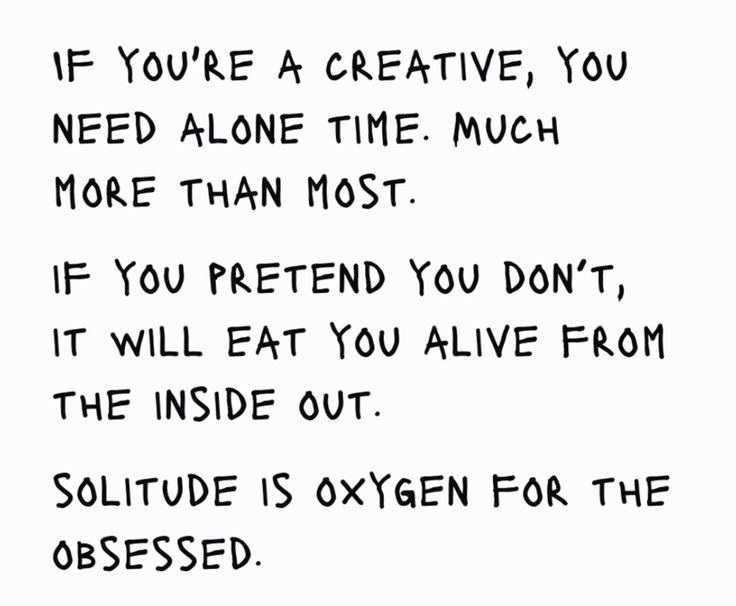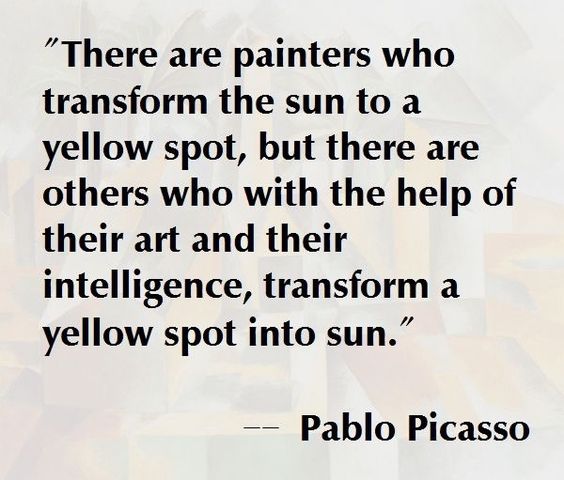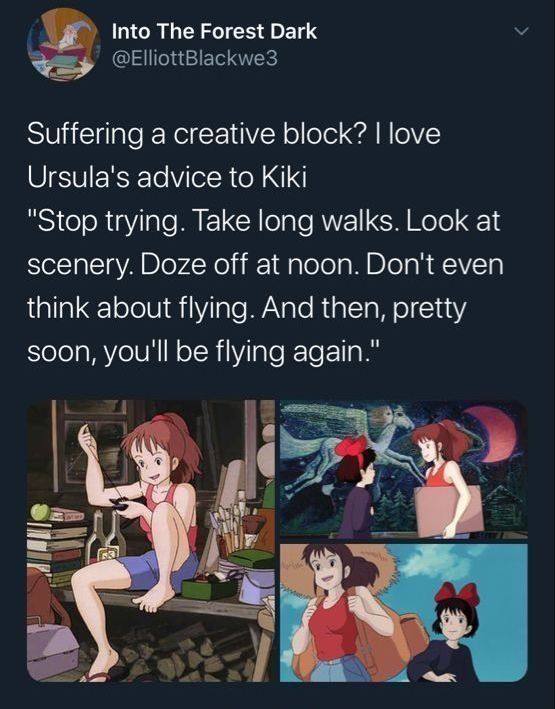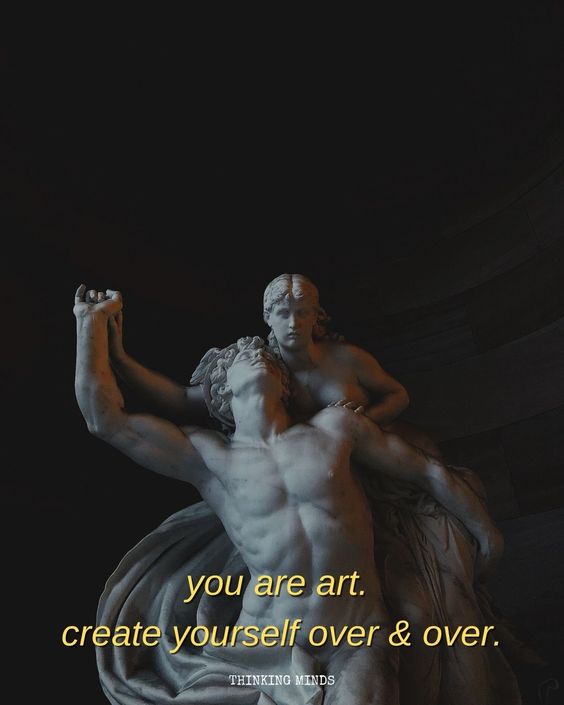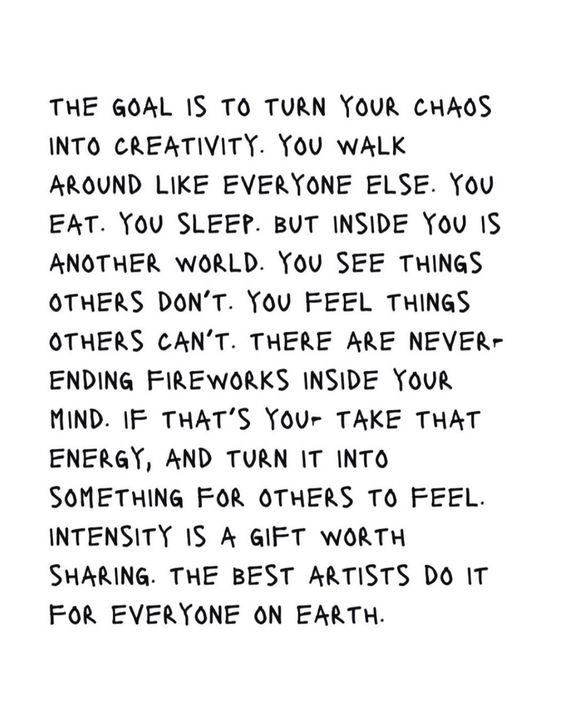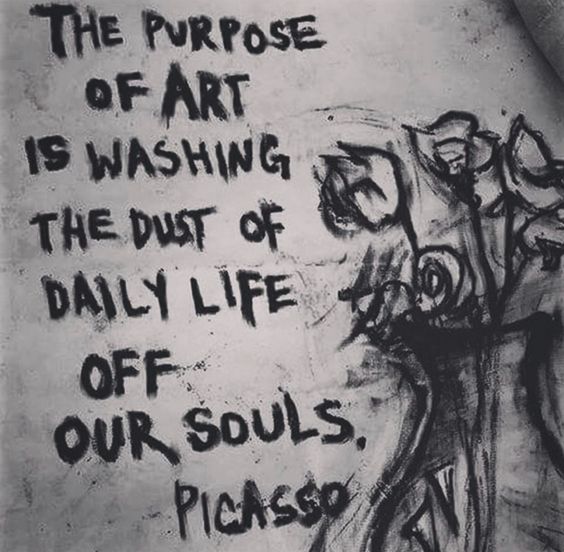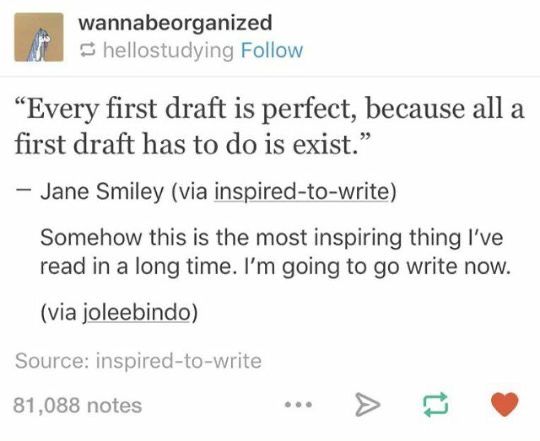“Inspiration comes on the twenty-fifth attempt, not the first. If you want to make something excellent, don’t wait for a brilliant idea to strike. Create twenty-five of what you need and one will be great. Inspiration reveals itself after you get the average ideas out of the way, not before you take the first step.”
James Clear
“I share with painters the desire
Nikki Giovanni, Cotton Candy on a Rainy Day
To put a three-dimensional picture
On a One-dimensional surface.”
“Science can never win against art, and logic can never win against love. History can never win against myth, and reality is poor compared to dreams, very poor. So if you carry any idea against imagination, drop it. Because we all carry it—this age is very anti-imagination. People have been taught to be factual, realistic, empirical, and all sorts of nonsense. People should be more dreamy, more childlike, more ecstatic. People should be able to create euphoria. And only through that do you reach your original source.”
Osho, Everyday Osho (Page 249)
“It took me years to learn to finish a project. In other words, to develop killer instinct. Seth Godin prefers the verb ‘ship.’ He means if we’ve been designing the new iPhone for the past eight years and it’s finally ready… Ship it! That’s killer instinct. What, exactly, are we ‘killing’? We’re killing Resistance. We’re sinking our dagger into the insidious, pernicious, rotten, sneaky, evil force of our own self-sabotage. Our own hesitation. Our own fear of success (or failure). Killer instinct is not negative when we use it to finish off a book, a screenplay, or any creative project that is fighting us and resisting us to the bitter end.”
Steven Pressfield, Put Your Ass Where Your Heart Wants To Be (Page 121)
“What fascinates me about the character of Alexander the Great is that he seemed to see the future with such clarity and such intensity as to make it virtually impossible that it would not come true—and that he would be the one to make it so. That’s you and me at the inception of any creative project. The book/ screenplay/ nonprofit/ start-up already exists in the Other World. Your job and mine is to bring it forth in this one.”
Steven Pressfield, Put Your Ass Where Your Heart Wants To Be (Page 104)
“For writers and artists, the ability to self-reinforce is more important than talent. What exactly is reinforcement? It’s when your coach or mentor tugs you aside and tells you how well you are doing, how proud of you they are, and how certain they are that ultimate success will be yours if you just stay who you are and keep doing what you’re doing. That’s reinforcement. Can you tell yourself that? Without a coach? Without a mentor? Can you be your own coach and mentor? That’s self-reinforcement. When we say, ‘Put your ass where your heart wants to be,’ we also mean keep it there. Self-reinforcement keeps us there. It keeps us committed over the long-haul.”
Steven Pressfield, Put Your Ass Where Your Heart Wants To Be (Page 95)
“When I finish the day’s work, I turn my mind off. The office is closed. The work has been handed off to the Unconscious, to the Muse. I respect her. I give her her time. If I see family or friends, I never talk about what I’m working on. I politely deflect any queries. But beyond not talking with others, I refuse to talk to myself. I don’t obsess. I don’t worry. I don’t second-guess. I let it rest. The office is closed.”
Steven Pressfield, Put Your Ass Where Your Heart Wants To Be (Page 79)
“I stop working when I start making mistakes. Typos and misspellings tell me I’m tired. I have reached the point of diminishing returns. Steinbeck said he always wanted to leave something in the well for tomorrow. Hemingway believed you should stop when you knew what was going to happen next in the story. You and I, as writers and artists, are playing always for tomorrow. Our game is the long game. When you’re tired, stop.”
Steven Pressfield, Put Your Ass Where Your Heart Wants To Be (Page 78)
“It goes without saying, I have turned off all external sources of distraction. No phone. No e-mail. No Instagram. No Facebook. I am on an ice floe in Antarctica. I’m circling alone at seventy thousand feet. I’m on the moon. Barring a nuclear attack or a family emergency, I will not turn my attention to anything that’s not happening inside my own demented brain.”
Steven Pressfield, Put Your Ass Where Your Heart Wants To Be (Page 76)
“Here’s my frame of mind as I sit down to work: This is the day. There is no other day. This is the day. In other words, I release every thought that smacks of, ‘Maybe we can do this some other time.’ There is no other time. Today is the Superbowl. Today is the day I give birth. Today is the day I die.”
Steven Pressfield, Put Your Ass Where Your Heart Wants To Be (Page 74)
“Can we put our ass where our heart wants to be if we’ve got a family, a job, a mortgage? Yes. The Muse does not count hours. She counts commitment. It is possible to be one hundred percent committed ten percent of the time. The goddess understands.”
Steven Pressfield, Put Your Ass Where Your Heart Wants To Be (Page 58)
“When you and I put our ass where our heart wants to be, the universe responds. We change. We see ourselves differently. But others, sometimes those we are not aware of (and whom we have no idea are aware of us), see us differently too. They may come to our aid in ways we could never have predicted and by some word or act of kindness change everything.”
Steven Pressfield, Put Your Ass Where Your Heart Wants To Be (Page 41)
“Station your physical body in the spot where your dream-work will and must happen. Want to write? Sit down at the keyboard. Wanna paint? Step up before the easel. Dance? Get your butt into the rehearsal studio. Dumb and obvious as it sounds, tremendous power lies in this simple physical action.”
Steven Pressfield, Put Your Ass Where Your Heart Wants To Be (Page 11)
